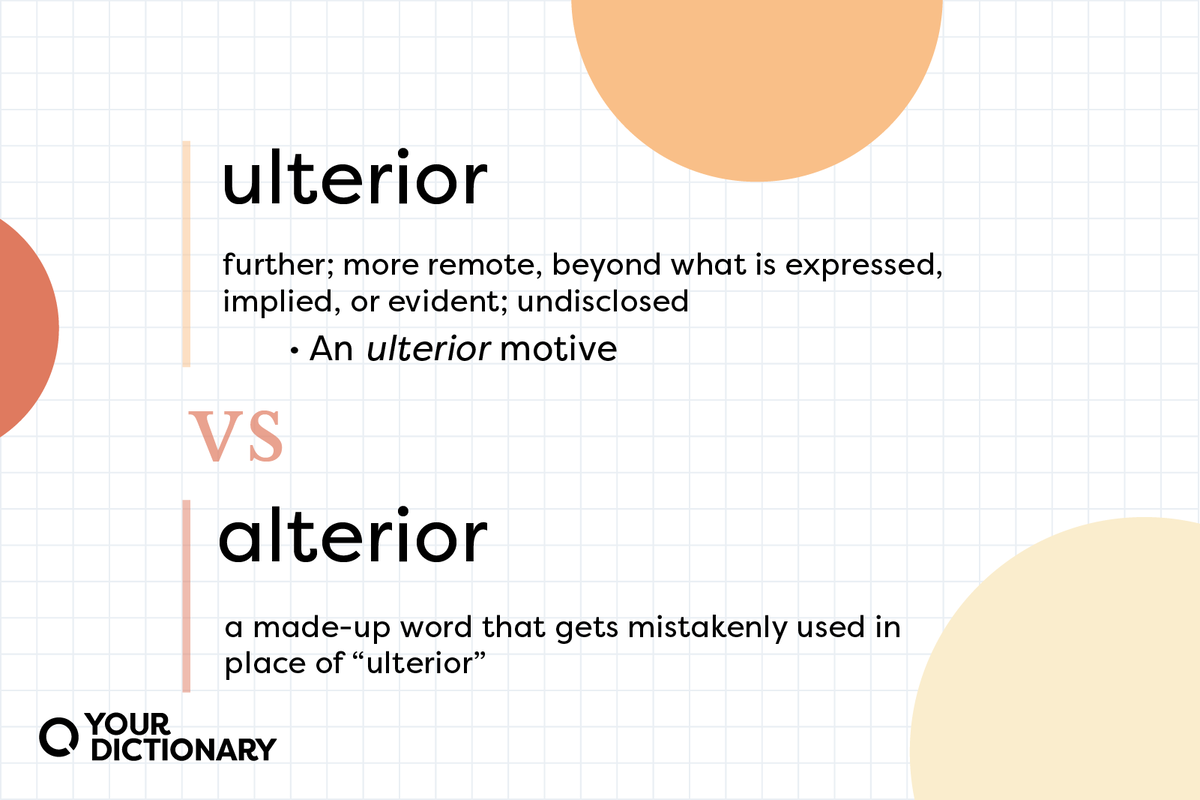
The difference between ulterior and alterior is simple: ulterior is a real word, and alterior isn’t.
If you’ve ever spelled the word as alterior, you aren’t alone. There’s no ulterior motive behind this mistake though; it mainly comes from mishearing the word ulterior. But why is this mistake so easy to make, and how can we all avoid it in the future?
What Does “Ulterior” Mean?
Ulterior is an adjective meaning “hidden, unrevealed, or below the surface.” Ulterior is pronounced as (uhl-teer-ee-er). Ulterior is a Latin loanword with its root, ulter, meaning “that is beyond.”
You can use ulterior whenever there’s something hidden beyond something else. It could be beyond it physically, like an ulterior building being behind others in a complex, or figuratively, as an ulterior use being a function of a product beyond its intended use.
Examples of ulterior look like:
- I couldn’t help but feel like the politician’s words had an ulterior meaning.
- Every step of his plan was designed to push an ulterior agenda.
- The ulterior parts of the design could use a bit more attention to detail.
Other Forms of “Ulterior”
Ulterior is generally used as an adjective, meaning “hidden, unrevealed, or below the surface.” But the word can function as other parts of speech as well.
- The noun form of ulterior means “a further goal.”
- Ulteriority, a noun derived from the term, means “something that is hidden or in the back.”
- Ulteriorly is an adverb form of ulterior meaning “afterward.”
The noun and adverb forms of ulterior are used differently than the adjective form. Examples of these forms include:
- I don’t care about the ulteriorities of the matter as long as it gets done.
- I am focused on this portion, but I plan to finish that side ulteriorly.
- If you want to pursue the ulterior, you better start switching over now.
What Is an “Ulterior Motive”?
Ulterior is frequently used in the phrase ulterior motive meaning “an additional reason for doing something.” Usually, people conceal or hide their ulterior motives and follow them for personal gain. But, social sleuths and snoops who see someone acting for multiple reasons can identify these motives.
Examples of how to use ulterior motive in a sentence include:
- When people are that nice for no reason, I always suspect they have an ulterior motive.
- I should come clean to them about my ulterior motives for wanting them to join.
- His ulterior motive for pursuing the lawsuit was eliminating his competition.
So, does that make ulterior a negative word? Ulterior in itself is neither positive nor negative. Ulterior motive, though, usually carries a negative connotation, but the phrase can describe a hidden reason to help others or do good as well.
Fast Fact
One of the earliest written accounts of the phrase ulterior motive was in a sermon by 1600s English theologian Richard Hooker discussing humans and their tendency to employ ulterior motives when being kind.
What Does “Alterior” Mean?
Alterior is actually not a real word. It’s not a slang term either. It’s just a common misspelling of ulterior. The short a sound “aw” in alterior can sound similar to the short u sound “uh” in ulterior.
Some words using this short a sound, like alternate or alternative, come from the Latin al- or alter, often used to give terms the meaning “other” or “of another.” In the phrase ulterior motive, ulterior generally means “other” or “alternative.” That, partnered with the a and u sounds being similar, is likely where this misspelling comes from and why the spelling alterior came to be.
What Is an “Alternative Motive”?
An alternative motive isn’t the same as an ulterior motive. That’s because alternative’s meaning is “a possible selection,” which makes an alternative motive a “possible reason for doing something.”
The reason for doing something is the proper distinction between alternative and ulterior motives.
- When someone does something with an ulterior motive, they perform an action primarily to fulfill their hidden desire.
- When someone acts with an alternative motive, it likely means their initial reason for acting is no longer viable or beneficial, so they have to change goals.
In an example case of someone running a marathon to win a prize:
- Someone with an ulterior motive would say they are running for fun, but are actually in it for the prize.
- Someone with an alternative motive would start running with their goal to get the prize. But, when they get outmatched, they would switch to a goal of running for fun.
Tips To Remember the Difference Between “Ulterior” and “Alterior”
To remember whether to use alterior or ulterior motive, remember that ulterior motives happen under the surface of something. U for under and U for ulterior.
To hear the difference between the uhl and the awl sound, compare some other words like ultimate and bulb to terms like alter or ball.
Make Learning Your Ulterior Motive
To read up on some other commonly confused words and phrases, check out these articles: